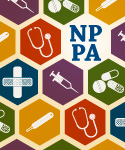September 21st, 2016
An American in Yorkshire: Initial Impressions of the NHS
Megan Tetlow, PA-C

Megan Tetlow, PA-C, is from Fort Myers, Florida, now working in Sheffield, England, as part of the National Physician Associate Expansion Program. She practices in gynecologic oncology and is a guest blogger for In Practice.
Faster than you can say “cheers,” summer is turning into fall, and I find myself having passed the 2-month mark as a physician assistant working for the National Health Service (NHS) in Yorkshire, England, as part of the National Physician Associate Expansion Program (NPAEP). There have been learning experiences, celebrations, crossed wires, and countless cups of tea as I continue to learn more about the NHS and the role for PAs here in the U.K. Today, I’d like to share a couple of misconceptions I had about the NHS prior to making the journey to jolly old England.
Waiting Times
Since the U.K. has nationalized healthcare, I had envisioned months-long waiting lists for appointments and surgeries, particularly to see a specialist. While I cannot speak for other areas in medicine, in gynecologic oncology this has not at all been the case. The reason why,  I believe, has a lot to do with the target-date-based pathway system the NHS uses, which prioritizes patients with a diagnosis of a gynecologic malignancy. With a cancer diagnosis, a window is assigned in which the patient must be seen by the appropriate specialist and receive definitive treatment (31 and 62 days, respectively). Additionally, there are special “fast-track” clinics that I work in that exclusively deal with patients presenting with symptoms suspicious of a gynecologic cancer, and these patients must be seen within 2 weeks. I think you would be hard-pressed to consistently meet that mark when referring to a specialist in the U.S. Additionally, there are sanctions if not enough patients are seen and treated within the specified windows. So understandably, there is a focus to get these patients seen as soon as possible. And in working terms, it means that patients are seen by the diagnostic gynecology team (which includes yours truly) and, if needed, the gynecologic oncology team (which as it happens, also includes me) pretty impressively quickly.
I believe, has a lot to do with the target-date-based pathway system the NHS uses, which prioritizes patients with a diagnosis of a gynecologic malignancy. With a cancer diagnosis, a window is assigned in which the patient must be seen by the appropriate specialist and receive definitive treatment (31 and 62 days, respectively). Additionally, there are special “fast-track” clinics that I work in that exclusively deal with patients presenting with symptoms suspicious of a gynecologic cancer, and these patients must be seen within 2 weeks. I think you would be hard-pressed to consistently meet that mark when referring to a specialist in the U.S. Additionally, there are sanctions if not enough patients are seen and treated within the specified windows. So understandably, there is a focus to get these patients seen as soon as possible. And in working terms, it means that patients are seen by the diagnostic gynecology team (which includes yours truly) and, if needed, the gynecologic oncology team (which as it happens, also includes me) pretty impressively quickly.
Team-Based Approach
 Another misconception I had about working in the NHS is that doctors and patients would be resistant to the idea of physician assistants. This again has not at all been my experience. Doctors in the NHS seem very interested in my role, training, and the type of work I’m able to perform. As in the U.S., the NHS is experiencing a shortage of healthcare providers. My experience is that most doctors are very open to midlevel providers and other solutions that would help meet some of that patient demand. Furthermore, since every hospital in the U.K. trains physicians (as opposed to solely academic centers doing the training, like in the U.S.), these physicians-in-training make up a large part of the care providers in the NHS. I believe that as a result of this, doctors, staff, and patients especially all seem quite comfortable with the idea of team-based healthcare. Coming from the U.S., I was accustomed to explaining my role as a physician assistant to new patients and envisioned I would be having these discussions a lot more in the U.K. But what I’ve found is that patients are so used to seeing a physician-in-training or advanced nurse specialist when they have an appointment with an attending physician, that when Megan the PA walks in instead, it seems not to faze them in the least. (This does not extend to my accent, which is often a topic of conversation, and patients seem to enjoy betting their significant other over whether I’m American or Canadian.) Overall, patients seem happy to be seen and provided good care, regardless of my specific role (or accent for that matter).
Another misconception I had about working in the NHS is that doctors and patients would be resistant to the idea of physician assistants. This again has not at all been my experience. Doctors in the NHS seem very interested in my role, training, and the type of work I’m able to perform. As in the U.S., the NHS is experiencing a shortage of healthcare providers. My experience is that most doctors are very open to midlevel providers and other solutions that would help meet some of that patient demand. Furthermore, since every hospital in the U.K. trains physicians (as opposed to solely academic centers doing the training, like in the U.S.), these physicians-in-training make up a large part of the care providers in the NHS. I believe that as a result of this, doctors, staff, and patients especially all seem quite comfortable with the idea of team-based healthcare. Coming from the U.S., I was accustomed to explaining my role as a physician assistant to new patients and envisioned I would be having these discussions a lot more in the U.K. But what I’ve found is that patients are so used to seeing a physician-in-training or advanced nurse specialist when they have an appointment with an attending physician, that when Megan the PA walks in instead, it seems not to faze them in the least. (This does not extend to my accent, which is often a topic of conversation, and patients seem to enjoy betting their significant other over whether I’m American or Canadian.) Overall, patients seem happy to be seen and provided good care, regardless of my specific role (or accent for that matter).
These are just a couple of the comparisons between the American and British healthcare systems that I’ve been attempting to mentally catalogue during these past months. This experience continues to be eye-opening, exciting, and at times a bit daunting. I look forward to exploring and dissecting more of these similarities and differences in the near future. Until then, if you have any questions about the workings of the NHS or physician associates in the U.K., please post them below and I will try to address them in a future post.


Hi- Your experience fascinates me. I am a Neonatal Nurse Practitioner- Are you seeing this role utilized and to what extent?
Thank you for any input
Dear Deb,
I am a junior trainee in Paediatrics and I’m currently on a 6 month placement in a level 3 NICU in the UK.
There are two advanced neonatal nurse practitioners on the unit.
One is a bit more experienced and the other is a bit more junior.
They are part of our doctor’s rota and they do things we do as well, e.g. attend deliveries, various procedures (venepuncture, cannulation periph/UVC/UAC, etc.), prescribing medication, cranial ultrasounds, reviewing patients.
I hope I could provide some insight into that. Let me know if you have any more questions.
Kind Regards,
Chris
Dear Deb,
I have not personally worked with any nurse practitioners in the gynecology department but my colleagues in the program in internal medicine and urgent care do and rave about them and their clinical expertise. I would be really interested in getting some more information together for a future post about nurse practitioners here in the UK and how their role/training is similar and different from that in the US. Thanks for the great idea!
Dear Christoph,
Thank you for your comment! It’s always so great to get more information and perspective from UK doctors and providers, and thank you for reading!
Hi Megan! I am so enjoying your posts on working in the UK; thanks for sharing! I am curious – my understanding of the PA practice in the UK includes that you cannot write prescriptions there, at least not without the physician’s on-site approval of individual scripts. Is this true, and if so how do you find this limitation?
Best,
Taryn
Dear Taryn,
Yes your understanding is completely correct that currently in the UK, physician associates are presently unable to prescribe medication (outpatient or inpatient) and order any imaging studies that use ionizing radiation. Luckily for me in gynecologic oncology, we don’t prescribe a lot of medications in the outpatient clinic. In the gyn clinic, I review the case with the attending physician and ask them to write the script. Also luckily, gyn is heavily ultrasound dependent, which I am able to order, but I have to have another provider order any CTs, which sometimes can get cumbersome, especially during a busy clinic day. You bring up a great point and I think I will plan on doing some research and writing a post on the present differences in practice for PAs in the US and the UK, and possible limitations/challenges that UK PAs might face. Thank you for your interesting comment and for reading!
Thanks for the insight, Megan! I am looking forward to reading that post, and all future others. Watching with interest!
Best regards from the USA,
Taryn Smith, PA-C
Thanks so much for sharing your experience! I look forward to future posts- I’m interested in practicing in the UK sometime in the future and yours is the first blog by a U.S. trained PA I’ve seen. 🙂
Thanks for your feedback Heather!
You also might want to check out http://www.parecruitmentsolutions.co.uk if you’re looking for positions in the UK!
Hi Megan I am an Ob/gyn in Tanzania where cervical cancer is a huge burden and had the opportunity to train with prof David Luesley at Birmingham Women’s hospital in Birmingham on colposcopy and LEEP or LLETZ procedure and am so proud to get that experience in the UK
Dear Dr Ramaiya,
Wow that does sound like a great experience. It’s so wonderful that online platforms like the Journal Watch Blogs exist to connect healthcare professionals from all over the world! Thank you for reading!
Sincerely,
Megan
Thank you for sharing your experiences, Megan. Thank you too for your work as an ambassador for the PA profession in the UK. The National Physician Associate Expansion Programme is so lucky to have you!
Hi Megan! I am currently a PA student and am interested in going to the UK after graduation. What type of program are you a part of and what qualifications are needed to be accepted to the program?
I noticed Ms. Lucente posted about the National Physician Associate Expansion Programme. Is that the group you are working with?
Thank you for your time!
Lindsey
Hi Lindsey! Yes I work with the National Physician Associate Expansion Programme here in the UK. Your NCCPA certification is recognized here, the trickier part might be the visa situation, if like me you aren’t a UK National or dual citizen. I had posted this to another commenter above, but I do know there are some recruitment companies that recruit US PAs to work in the US, one is http://www.parecruitmentsolutions.co.uk
Thanks!